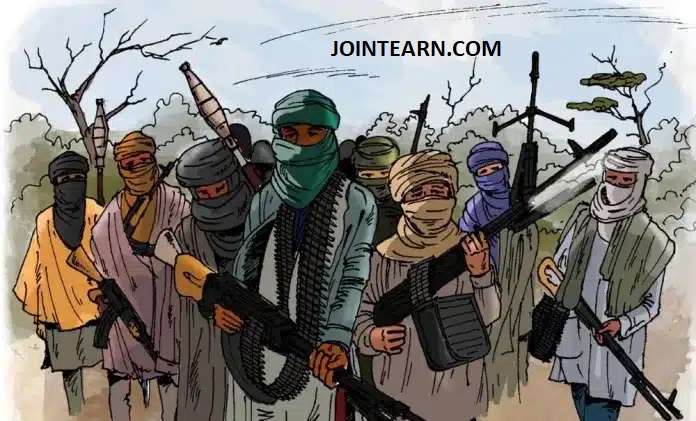A new and dangerous terrorist group known as “Mahmuda” has reportedly emerged in Nigeria, raising fresh concerns about national security and counterterrorism strategies. The group, whose activities are said to be rapidly spreading across parts of the North-East and North-West, is believed to have links to other extremist networks and is allegedly responsible for a string of recent attacks on villages, security operatives, and government installations.
The emergence of this group is coming to light two years after the Nigerian Senate reportedly received a security briefing warning about the rise of a new splinter terrorist organization forming in remote areas of Borno and Zamfara States. At the time, the warning was allegedly dismissed or not given the urgent attention it deserved.
Early Signs and Senate’s Missed Alert
According to security sources and intelligence reports made available in 2022, lawmakers were cautioned about the activities of certain radical factions splitting from existing terrorist groups such as Boko Haram and the Islamic State West Africa Province (ISWAP). These factions, according to reports, were dissatisfied with their leadership and were planning to form new cells to pursue more extreme ideologies.
One such cell is now known as the Mahmuda group, reportedly named after its elusive leader, simply referred to as “Mahmuda,” a former commander in a larger insurgent group who broke away to establish his own following.
In a confidential security memo sent to the Senate Committee on Defence and National Security in 2022, analysts warned:
“There is a growing intelligence signal that certain extremist cells in the North-East are fragmenting. One splinter cell under the command of a radical former field commander is gaining ground in rural border communities. This development, if not checked, may evolve into a full-fledged terror network.”
Despite the warning, it appears that little or no strategic action was taken at the federal level to contain the threat, allowing the group time to recruit, expand, and entrench itself in hard-to-reach areas.
Mahmuda Group’s Operational Zones and Modus Operandi
Reports emerging from the field indicate that the Mahmuda group has set up camps in forested areas straddling parts of Borno, Katsina, Zamfara, and the eastern borders of Niger Republic. The group is said to engage in guerrilla-style warfare, using ambushes, improvised explosive devices (IEDs), and coordinated raids on both civilian and military targets.
Unlike Boko Haram, which focused largely on ideological and religious dominance, or bandits who focus on ransom, Mahmuda appears to combine both—terrorizing communities and also profiting from kidnappings, illegal mining, and cattle rustling.
Security analysts have warned that the group could become the most dangerous terror cell in Nigeria if not swiftly addressed, citing its fluid structure, harsh indoctrination process, and willingness to work with other criminal gangs across the Sahel region.
Intensifying Attacks and Rising Casualties
Since early 2024, the group has reportedly claimed responsibility for multiple attacks, including a raid on a military checkpoint in northern Zamfara, the abduction of several women and children in Borno, and the torching of local government buildings in Katsina.
In March 2024 alone, over 100 people were reportedly killed in attacks believed to have been carried out by Mahmuda fighters. Many villages in vulnerable regions have been deserted as residents flee for fear of further violence.
Residents of some affected areas have accused security forces of failing to protect them. “We have cried out several times. We heard this new group is more brutal. People are disappearing from their farms and homes,” said a community leader from Zurmi, Zamfara.
Government’s Response and Renewed Military Interest
The Federal Government, through the Ministry of Defence, has now confirmed the existence of the Mahmuda group and announced that special counterterrorism units are being deployed to neutralize their camps.
The Chief of Defence Staff, General Christopher Musa, during a recent security briefing, acknowledged the group’s growing influence and vowed that military operations in the affected areas would be intensified.
“We are aware of the activities of this new terror element. They are being closely monitored. Counter-operations have already begun, and we are working with regional partners to track their movement and supply lines,” Musa said.
Call for Accountability and Strategic Overhaul
As the Mahmuda group grows bolder, security experts and civil society organizations are calling for an independent probe into why the 2022 Senate warning was not acted upon.
“We need to understand how such a critical warning went unheeded. This speaks to a larger problem of policy implementation and security coordination. These gaps must be addressed to avoid future lapses,” said Dr. Zainab Mohammed, a security analyst and fellow at the Centre for Strategic Peacebuilding.
Lawmakers, too, are now being pressured to revisit the 2022 warning and investigate the reasons behind the delayed response.
Senator Ahmed Lawal, a member of the Senate Committee on Security, admitted the Senate had received classified reports in 2022 but did not confirm whether any formal action was taken. “We will look into it again. The emergence of a new terror group is a national threat and must be dealt with decisively,” he said.
Conclusion
The emergence of the Mahmuda terrorist group has further complicated Nigeria’s already fragile security landscape. With citizens in affected regions crying for help and the military scrambling to respond, questions remain about the effectiveness of early-warning systems, inter-agency cooperation, and political will.
For now, all eyes are on the government and security agencies as Nigerians await a swift and effective clampdown before the Mahmuda threat spirals into a larger insurgency.












